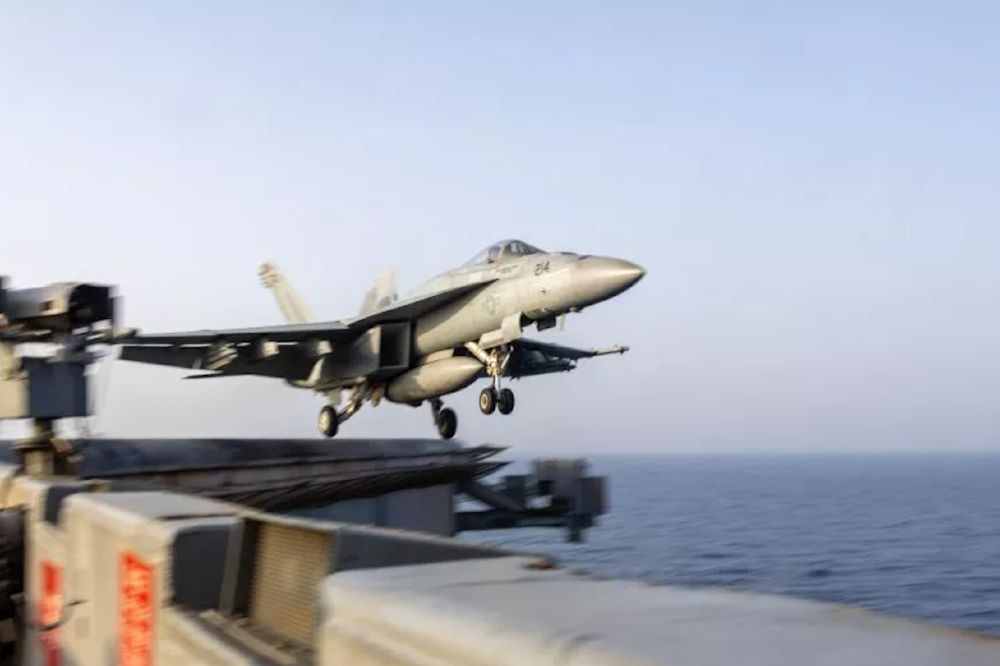Ansar Allah undeterred despite month-long US attacks on Yemen
Analysts believe that Trump's purely military approach regarding Yemen will not be enough to end Yemen's Ansar Allah.
-

An F/A-18E Super Hornet launches from the flight deck of the aircraft carrier USS Harry S. Truman (CVN 75) during operations (US Navy)
A month into persistent US-led air aggression, the Yemeni Armed Forces are countering US efforts to end operations against "Israel" and Israeli ships in the Red Sea.
The air attacks against Yemen's Ansar Allah were the first significant military operation undertaken by Trump during his second term and were thus viewed as a test of both will and military capability.
According to data from the US Central Command (CENTCOM) tracked by the Institute for the Study of War, jets flying from the USS Harry S. Truman, joined by the USS Carl Vinson on April 10, are conducting dozens of near-daily airstrikes from the Red Sea.
Despite claims of considerable damage, including the killing of hundreds of Yemeni civilians, which the US claim are Yemeni fighters, the YAF have shown minimal signs of retreat.
In response, the YAF continued repeated attacks on Harry S. Truman. Ansar Allah has also launched missiles at Tel Aviv and other regions in occupied Palestine, sounding alarms and creating panic and havoc in recent weeks, especially on Sunday.
The YAF announced that its UAV unit downed yet another US MQ-9 drone on Sunday, marking the 19th UAV downed by the YAF in response to the ongoing US aggression against Yemen and its horrific massacres against the Yemeni people and as the US continues its aggression on Yemen in support of "Israel".
With the estimated unit cost of an MQ-9 drone at around $33 million, the total losses incurred by the US from the downing of these drones in Yemen have now surpassed $600 million.
Last week, Emily Milliken, Associate Director of the Atlantic Council's N7 Initiative, stated that Ansar Allah's "group resilience, strategic adaptability, and deep-rooted influence within Yemen," should not be underestimated.
Milliken further noted that a purely military approach would not achieve Washington's goals of ending the group's capabilities.
US spending billions on Yemen strikes with limited impact
The United States has spent over $200 million in precision munitions alone in just three weeks of intensified strikes against alleged Ansar Allah targets in Yemen, with the total cost of the operation expected to surpass $1 billion by next week, The New York Times reported earlier this month.
But despite the scale and expense of this offensive, US officials privately acknowledged it has been very limited in deterring Yemeni missile operations or downgrading their capabilities.
Although US President Donald Trump has described Ansar Allah as “decimated” by what the Pentagon has dubbed Operation Rough Rider, launched on March 15, military and intelligence officials speaking to Congress and allies in private briefings admit that most of the Yemenis' vast, underground arsenal of missiles and drones remains intact.
According to the report, reinforced bunkers and concealed weapons stockpiles have blunted the impact of daily airstrikes carried out by US Navy and Air Force aircraft.
US aggression won't weaken our military capabilities: Al-Houthi
In a speech delivered on Thursday, Sayyed Abdul Malik al-Houthi, the head of Ansar Allah, stated that the US has failed to diminish the group's military strength.
The leader of Ansar Allah affirmed that "the Americans have not been able, and will never be able, to weaken our military capabilities," asserting that "the American aggression only contributes to further developing them more and more."
Sayyed al-Houthi further asserted that the US cannot undermine Yemen’s military stability, as it is built on unshakable ideological foundations and deeply entrenched resilience, while also condemning America’s intensified efforts to exert pressure on Yemen both politically and publicly, which he claimed was the motive behind their latest aggressive campaign targeting civilian infrastructure in the country.
He emphasized that "the Yemeni stance has an economic, security, military, and strategic impact on the Israeli enemy, and this is a very concerning situation for the enemies."
This comes as the United States continues to conduct brutal aggression on Yemen, killing hundreds of civilians, including women and children, since mid-March.

 4 Min Read
4 Min Read








